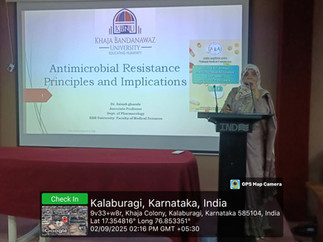Workshop on Public Health Aspects of Antimicrobial Resistance
- barikhateeb
- Sep 2, 2025
- 2 min read
The Department of Community Medicine, Faculty of Medical Sciences, in collaboration with the Internal Quality Assurance Cell (IQAC), KBN University, organized a comprehensive Workshop on Public Health Aspects of Antimicrobial Resistance (AMR) on 2nd September 2025 for MBBS Phase-III Part-I students, interns, and postgraduate students. The program aimed to raise awareness about the global health threat posed by AMR, educate students on rational antibiotic use, and inspire them to actively contribute to infection control and antimicrobial stewardship.
The event was graced by Prof. Ali Raza Moosvi (Hon’ble Vice Chancellor, KBNU) and Prof. Syed Ashfaq Ahmed (Pro Vice Chancellor, KBNU), along with distinguished dignitaries: Mir Vilayat Ali (Registrar, KBNU), Dr. Zama Moosvi (Dean, Academics), and Dr. Abdul Baseer (Director IQAC & CoE i/c). The workshop was convened by Dr. Guruprasad K Y (Dean, FOMS, KBNU).
The academic sessions commenced with an engaging lecture by Dr. Zainab Gazala (Associate Professor, Pharmacology), who elaborated on the principles and implications of AMR, mechanisms of resistance, and its growing global impact. This was followed by a thought-provoking session by Dr. Mohammed K. Suhail, International Public Health Expert (Section Head, PH & IPC, King Salman Specialized Hospital, Saudi Arabia). Drawing from his global experience, he highlighted the public health aspects of AMR, its consequences on healthcare systems, and the crucial role of policy, research, and health interventions in addressing the crisis. Both sessions encouraged active interaction through Q&A with students and faculty.
An impactful role play on irrational antibiotic use was performed by MBBS students and interns, depicting common real-world issues such as over-the-counter sales, patient pressure on doctors, and self-medication. The enactment underscored the dangers of antibiotic misuse and the urgent need for stewardship and public awareness.
At the conclusion, all participants took a pledge to promote the rational use of antimicrobials, vowing to commit to responsible prescribing, patient education, and infection prevention practices.
The valedictory session included inspiring addresses by Dr. Mohammed K. Suhail, who emphasized the growing scope of Public Health and Community Medicine, and Dr. Guruprasad K Y, who urged students to integrate rational antibiotic practices into their careers. Dr. Abdul Baseer further highlighted the role of academic institutions in fostering socially relevant medical education and research.
With the participation of 176 attendees including students, interns, faculty, and an international public health expert, the workshop concluded with a vote of thanks by Dr. Sayyad Tajammul Usman and a high tea that provided opportunities for meaningful interaction and reflection.
The workshop successfully reinforced KBNU’s mission to promote academic excellence, ethical medical practices, and global health responsibility.
























































Comments